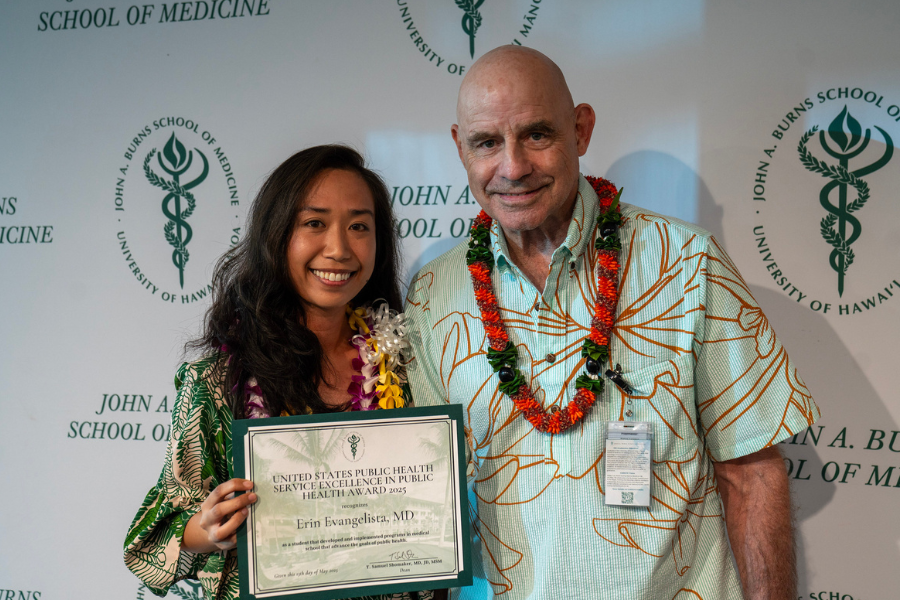
When Erin Evangelista received the Excellence in Public Health Award, it was just another example of her lifelong dedication to improving rural health.
Evangelista, a 4th-year medical student at JABSOM, aims to address healthcare disparities in rural communities, a passion that was ignited long before she stepped onto the Kakaʻako campus.
“Honestly, it was kind of like a full circle moment,” Evangelista said. Before enrolling in JABSOM, she was part of the United States Public Health Service, serving in South Dakota and working with Indian Health Reservations. With an engineering degree, she focused on the engineering aspects of rural health, an experience that offered her a unique perspective. “I wanted to be involved in that side of rural health since I’ve never seen that part of the U.S.,” she said.
Evangelista’s experience in the rural Midwest wasn’t her first encounter with rural health. Born in California, she moved to the Philippines at the age of 12, where she lived for four years before coming to Hawaiʻi. Her time in Taytay, Rizal, outside Manila, exposed her to communities where health education and exposure to healthcare careers were severely lacking.
“We didn’t have a required PE or good techniques on how to eat healthy. We didn’t have any of that; it was strictly academic,” she said. “We didn’t really know what it meant to be a physician or what it meant to be a nurse, and we didn’t have any exposure to the different healthcare careers.”
This early exposure to rural challenges now found a parallel in her current journey as part of the inaugural cohort of the Kauaʻi Medical Training Track (KMTT). The KMTT program offers medical students an immersive experience in rural health, where they live, learn, and train on the Garden Isle.
“It’s been interesting,” Evangelista shared about her time on Kauaʻi. “I love the community on Kauaʻi. Everything and everybody is so tight-knit.” She recounted instances of seeing patients in a clinic during her third year, only to see them in public places like Target later, fostering a deeper, more personal connection.
However, Evangelista has also seen, first-hand, the significant obstacles in healthcare access and opportunities on Kauaʻi. “The longer I was there during third year, I started to see more of the limitations in terms of care, just because of what wasn’t available,” she explained.
This observation, coupled with volunteer work in local schools, became the catalyst for the Kaua’i Health Education Initiative (KHEI). “I noticed a lot of the students [and faculty] were saying, ‘Oh, we don’t have a lot of the opportunities that the Oʻahu students have.'” Evangelista said.
The voices of the health faculty advisors and students became the foundation for the KHEI, which Evangelista developed during her time as part of the KMTT. Her vision for KHEI stemmed from a personal realization during her high school years on Oʻahu. “I felt like I didn’t get a good exposure to what it meant to be healthy, and what it means to practice healthy living, as well as getting exposure to health careers,” she said.
The KHEI has two main ambitions. First, it aims to assess the efficacy of current health education among the three public high schools on Kauaʻi in efforts to determine systems of improvement in the high school curriculum. Second, KHEI strives to provide a voice to the student community and to involve them in improving their education.
“It’s going to take a little bit more time, just because it’s so involved, but we’re already working with the Department of Health and we hope to involve the Department of Education eventually to assess the program’s impact,” Evangelista said. “It’ll be a long process, but because of the Kauaʻi Medical Training Track, I’ll be here as an attending for four years, so I’m excited to see how that all plays out once I’m actually working on Kauaʻi.”
Evangelista is currently leaning towards specializing in OB/GYN, a specialty with a critical need on Kauaʻi. Her commitment to the KHEI program will continue even after she becomes an attending physician. “I see the healthcare system and the healthcare status of Kaua’i greatly improving because every year now, until the KMTT program is done, there’s going to be an influx of new physicians and a whole bunch of different specialties, depending on what all the students choose.” She envisions a “snowballing effect,” with KMTT participants becoming accessible mentors for high school students, furthering interest in healthcare careers. “Honestly, that’s really exciting to see where Kauaʻi’s health resources and public health, in general, is going to go.”
